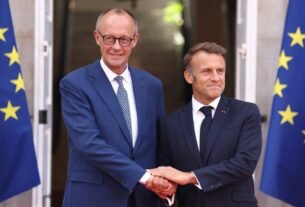Today’s edition is powered by FIGIEFA
Upcoming European Parliament plenary vote on End-of-Life Vehicles Regulation
—————————————————————————————————————
Good Friday afternoon, and welcome back to GBU. The European Quarter has lurched into life as politics returns to Brussels, set to a soundtrack of interminable drilling as Schuman roundabout is transformed into one of the city’s great demolition sites. Circumnavigating the traveaux now requires passing via side streets as the dream to build a “real town square” turns into a veritable cauchemar.
And whilst some of the Schuman denizens returned fresh-faced with sun-kissed complexions, others had been less lucky, obliged to steer Europe through a series of fraught negotiations that challenged the bloc’s authority and exposed divisions among members.
Notwithstanding Commission efforts to put a positive spin on developments – let there be no doubt we got “the best deal available” out of Trump – parliamentarians are more sceptical of the Turnberry outcome, if not downright acerbic.
To make matters worse, the goalposts are moving as our US partners level their sights on the EU digital rulebook – the flagship Digital Services Act and Digital Markets Act which would be powerful instruments to keep Big Tech in check and protect European internauts, unless the EU caves to US bullying or is just too afraid to actually use them.
Indeed, the summer months have highlighted a hazardous EU tendency to hesitate when confronted with existential challenges. Efforts to play for time have instead seen ground conceded to challengers, as an underlying strategic incoherence prevents the Union from taking bold steps, even when the need to do so is acknowledged within the Commission.
Europe’s missing moment
The present malaise was brought into sharp focus in Simon Nixon’s inaugural column for Euractiv, in which he outlines the failure to move towards a more integrated, robust, and (buzzword alert) competitive Europe.
Whatever momentum had been building when the new Commission took the helm has now dissipated, Simon says, as the continent flounders in the face of political and economic headwinds.
And the turmoil looks set to continue, with a vote of confidence on Monday is expected to bring down France’s government. The fallout will be felt in Brussels, not only due to the domestic upheaval as the country slides deeper into debt, but also as French far-left and far-right parties – whose MEPs hold the Commission in contempt – capitalise on the instability.
Mercosur movement
The deal with Latin America is a dinosaur of EU trade policy, but the current economic imperatives make it one we can no longer live without as Brussels scrambles to secure its financial future.
This saw the controversial deal inch towards completion as the deal was formally adopted by the EU executive, with key concessions to make it more palatable to long-established opponents.
Providing it gains approval from both the Council and the European Parliament, the deal could come into effect “by Christmas”.
Caught in the Plovdiv Triangle
The Commission President found herself flying blind on Sunday, as her plane was allegedly targeted by Russian blockers when attempting to land in the Bulgarian city of Plovdiv. The interference, we were told, knocked out the aircraft’s navigation equipment, leaving the pilots to rely on “paper maps” to touch down on terra firma.
The hairy episode highlighted a spike in such aerial malfeasance. But the plot thickened as the specifics of this incident were subsequently refuted by Bulgaria, as the prime minister said there was no evidence of “prolonged interference and jamming.”
Disagreement about what really happened was labelled an “informational mess” designed to “undermine Bulgarian institutions”.
Brussels, Europe’s most byzantine capital
Belgium’s politics are notoriously complex, with the country divided between French and Dutch speakers and 12 national parties competing in elections. The battle to secure a governing majority is even more fractious in Brussels, where majorities must be made for both the French and Dutch language communities, before agreeing the final formation for the region.
This has led to a bitterly entrenched political deadlock since elections in June 2024, with relatively small parties leveraging full influence to push their agenda. But the situation has become hopeless as certain factions refuse to compromise, no matter how “creative” the solutions proposed.
It had been hoped that after a summer break – and as the capital’s finances go from bad to worse – negotiators might be able to get over their red lines, not least as the city is confronted by a wave of drug-related violence.
Alas, a way forward that was unveiled on Monday was rejected in a matter of hours, most notably as the Flemish liberal party refuses any government that cuts out the Flemish nationalist party of Belgian Prime Minister Bart De Wever. For the francophone socialists – eager not to be further humiliated after taking a pounding in Wallonia – this is out of the question.
The standoff continues, debts rise, and Europe’s capital goes to the wall.
Want to get The Good, the Bad, and the Ugly in your inbox? Subscribe to The Brief.





